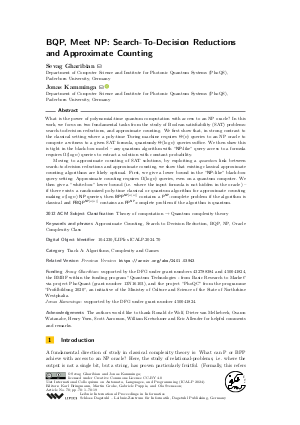@InProceedings{gharibian_et_al:LIPIcs.ICALP.2024.70,
author = {Gharibian, Sevag and Kamminga, Jonas},
title = {{BQP, Meet NP: Search-To-Decision Reductions and Approximate Counting}},
booktitle = {51st International Colloquium on Automata, Languages, and Programming (ICALP 2024)},
pages = {70:1--70:19},
series = {Leibniz International Proceedings in Informatics (LIPIcs)},
ISBN = {978-3-95977-322-5},
ISSN = {1868-8969},
year = {2024},
volume = {297},
editor = {Bringmann, Karl and Grohe, Martin and Puppis, Gabriele and Svensson, Ola},
publisher = {Schloss Dagstuhl -- Leibniz-Zentrum f{\"u}r Informatik},
address = {Dagstuhl, Germany},
URL = {https://drops.dagstuhl.de/entities/document/10.4230/LIPIcs.ICALP.2024.70},
URN = {urn:nbn:de:0030-drops-202134},
doi = {10.4230/LIPIcs.ICALP.2024.70},
annote = {Keywords: Approximate Counting, Search to Decision Reduction, BQP, NP, Oracle Complexity Class}
}

 Creative Commons Attribution 4.0 International license
Creative Commons Attribution 4.0 International license
